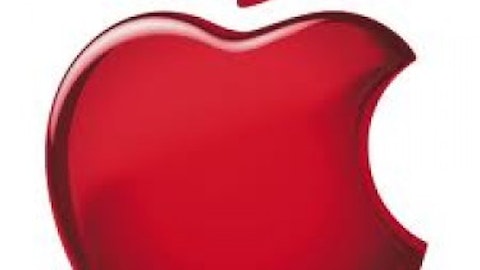Apple Inc. (NASDAQ:AAPL) has recently received a lot of flak. Its map application was criticized, its share price fell from $700 to around $400, and iPhone sales have almost become saturated.However, in spite of this boredom and fatigue with all things Apple, there are still clear signs of where Apple might be headed, at least in one segment.
Apple Inc. (NASDAQ:AAPL)’s iTunes is 10 years old and is the most successful music retailer in the world. The iTunes music store generated $4.1 billion of revenue in the recent quarter, and the numbers will not relent anytime in the near future.
iTunes has been used by millions of people to download billions of songs. The numbers are rather staggering. In the last 10 years, 25 billion songs have been sold, 35 million songs exist in its catalog, and the service is available in 119 countries.
Moreover, the iTunes music store is not a major source of Apple Inc. (NASDAQ:AAPL)’s revenue, and accounts foronly 9% of the top line. Its major business comes from iPhones and iPads, for a total of 72% ofits revenue.

People still prefer purchasing music to listen offline The iTunes music store has only continued to expand despite the growth of YouTube and streaming services like Pandora Media Inc (NYSE:P). Though on-demand video and audio streaming have become increasingly popular, people still continue to purchase music on the iTunes music store, suggesting that there is a clear preference for listening to music offline. There are several reasons why people prefer to listen to music offline.
Internet connections are not reliable across the world, and 3G/4G connections can simply be too expensive for most people to afford. Moreover, even when fast Internet connections are available for a relatively affordable price, the convenience of listening to music offline rests in device portability. Not every device is Internet enabled, and purchasing music files can solve that problem easily.
Apple may begin a radio streaming service
Moreover, Apple has been rumored to be starting a radio-streaming service similar to Spotify or Pandora Media Inc (NYSE:P). Considering how important radio streaming has become to most people, Apple will certainly want its existing iTunes music users to pay a subscription fee so that they can listen to music on demand. It’s unclear when and how this service will be launched, but most people who are familiar with Apple do believe that such a streaming service is in the offing.
There are genuine concerns that such a radio streaming service may cannibalize Apple’s iTunes music store, but such fears are unfounded. People who want to listen to music offline will nonetheless continue to purchase music on the music store and those who have access to unlimited and high-speed data plans will go ahead and pay a premium subscription fee.
Apple’s competitors in video and audio streaming
Google Inc (NASDAQ:GOOG)’s hugely popular YouTube is no longer just a video-viewing service, but a media juggernaut that generates more money for the company than many of its other services. However, what we should notice is that Google makes money from advertisements rather than actual music or subscription sales
Apple will not want to force advertisements on its users and will charge money in order to sustain a business model. Google Inc (NASDAQ:GOOG), on the other hand, has not been successful in either selling music or in a streaming service, though the company has tried quite a bit at both.
But as YouTube passes the milestone of 1 billion monthly-unique views, Google could very well be the only company right now that could possibly give subscription sales versus an ad-based model a genuine try. All the ingredients are there; the size of YouTube’s music audience is not only huge, but it’s also growing at an unprecedented rate. This therefore presents an opportunity too good for Google Inc (NASDAQ:GOOG) and music-label owners to pass up.



